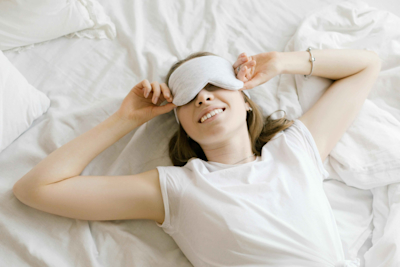
Sleep debt: can you catch up on sleep?
Trying to catch up on sleep?
We live in a world where every minute counts and productivity is often the measure of success. As a result, our sleep frequently takes a back seat.
Many of us fall into the trap of thinking we can just "catch up" on missed sleep over the weekend or during holidays. However, emerging research and expert opinions strongly suggest that this concept, often referred to as "sleep debt," is fundamentally flawed and misleading. The truth is, this is not how our bodies function.
Sleep is not a bank, and hours lost cannot simply be repaid like a financial obligation.
Understanding Sleep Debt
The term "sleep debt" implies that sleep is quantifiable and that any deficit can be compensated later. However, sleep doesn't quite work that way. Each night of insufficient sleep accumulates deficits in various cognitive and physiological functions, which can't be recovered merely by sleeping longer at a later time.
A 2016 study published in Scientific Reports highlighted that the symptoms of sleepiness and decline in performance due to sleep debt impact everything from memory and learning to metabolism and immune function.
The Body's Need for Regular, Consistent Sleep
Contrary to popular belief, sleeping in on the weekends doesn't rectify the harm caused by sleep deprivation during the week. The body's need for sleep is daily and individual, requiring more than just making up the hours. The body needs regular, consistent sleep to function properly. When you don't get enough sleep, your body can't repair itself as effectively and you may experience a variety of symptoms including fatigue, irritability and difficulty concentrating.
That's right, sleep is crucial for daily recovery and reorganization in the brain, and each lost hour creates a ripple effect that extends far beyond feeling tired.
Immediate and Cumulative Effects of Sleep Loss
Short-term sleep deprivation affects our cognitive abilities almost immediately, akin to being legally intoxicated.
Let's look at some stats:
According to the CDC, the effects of sleep deprivation and those of alcohol consumption on our cognitive and physiological abilities are quite comparable. participants were tested in two situations: one where they stayed awake for a very long time, and another where they had a certain amount of alcohol in their system. The findings of these studies are quite revealing:
Staying awake for 17 hours likens to the impairments at a BAC of 0.05%.
Enduring a full 24 hours without sleep equates to the functional impairment you’d expect at a BAC of 0.10%.
The effects of sleep deprivation and alcohol consumption are quite similar. The more tired you are, the more impaired your cognitive and physiological abilities become.
Sleep deprivation disrupts our attention span, decision-making capabilities, and reaction times. Over the long term, chronic sleep deprivation can lead to more severe health issues, such as weakened immune responses, weight management problems, and increased susceptibility to mental health disorders.
READ: Effects of chronic sleep deprivation on health & well-being
Why You Can't Just "Make Up" Sleep
The idea of recovering lost sleep by sleeping more later is a common misconception. Carla Picolli, a licensed psychologist and certified sleep coach, points to research, which shows that losing even one hour of sleep requires about four days to recover fully.
The recovery is not just about sleeping more, but restoring and resetting a disrupted biological rhythm.
READ: How to reset your circadian rhythm?
The Role of Healthy Sleep Hygiene
To combat the effects of sleep deprivation and minimize the accumulation of sleep debt, adopting good sleep hygiene practices is essential. This involves more than just the routines immediately before bedtime. Every action throughout the day plays a part in how well we sleep at night.
Here are some effective strategies to enhance sleep quality:
Consistent Sleep Schedule is KEY: Going to bed and waking up at the same time every day helps regulate your body's internal clock and improves sleep quality.
Daylight Exposure: Natural light exposure during the day helps maintain a healthy circadian rhythm.
Physical Activity: Regular physical activity improves sleep quality and reduces sleep onset time, however, it's best to avoid vigorous workouts close to bedtime.
Diet and Nutrition: Eating a balanced diet and reducing caffeine and sugar intake can promote better sleep.
Reduced Screen Time: We can't stress this point enough: Limiting exposure to screens and blue light before bedtime can help signal to your body that it's time to wind down. If you’re using your smartphone as an alarm clock, consider switching to a classic alarm clock, like Mudita Bell, or if you need more functions, consider Mudita Harmony.
Prioritizing Sleep with Mudita's Products
Because we recognize the importance of undisturbed, quality sleep, we developed products like the Mudita Bell and Mudita Harmony.
Mudita Harmony & Mudita Bell
These mindful alarm clocks are designed to support healthy sleep hygiene by encouraging natural waking processes, thus enhancing overall well-being and daily performance.
Rethinking Sleep Recovery
Instead of viewing sleep as a deficit that needs to be filled, it's more productive to consider sleep as a daily requirement. This mindset shift is crucial for long-term health.
Incorporating even small changes in daily routines, like ditching the smartphone alarm for a more traditional alarm clock, can significantly improve sleep quality and, by extension, life quality.
Bottom Line
The myth that you can catch up on sleep by sleeping more later is a dangerous one. It leads to unhealthy habits and misunderstandings about how sleep works. Instead of trying to catch up on sleep, it's important to focus on getting enough sleep each night. This will help you feel better and perform better during the day.
By acknowledging that sleep is a non-negotiable foundation of health and acting accordingly, we can all take meaningful steps toward better sleep and a healthier, more vibrant life.
Let's shift our focus from catching up on lost sleep to creating sustainable habits that support consistent, restorative rest. This approach not only enhances our well-being but also our daily productivity and long-term health outcomes.
To learn more about the intriguing subject of sleep, check out our Sleep Better resource page where we write extensively about the importance of sleep and the positive impact a good night’s rest has on our health and overall well-being.
If you would like to read more articles about the importance of sleep, rest & relaxation, check out these additional articles:
Also consider joining our Mudita Community on our forum.
Related stories

The Digital Detox Guide for Better Sleep
Struggling with poor sleep? Discover how a digital detox can improve sleep quality, support better sleep hygiene, and help you sleep better naturally.

Traveling with Mudita Kompakt & the Joy of Intentional Travel
Traveling with Mudita Kompakt proved that digital minimalism works. No distractions, effortless boarding passes & an impressive battery life. Read all about it!

10 Simple Steps to Sleep Better and Improve Sleep Quality
Struggling with sleep? Discover 10 simple, science-backed tips to improve sleep quality, build better habits, and wake up refreshed every morning.
If you'd like to receive the best stories from our blog, keep up to date with our progress and get notified about our product releases and special discounts.